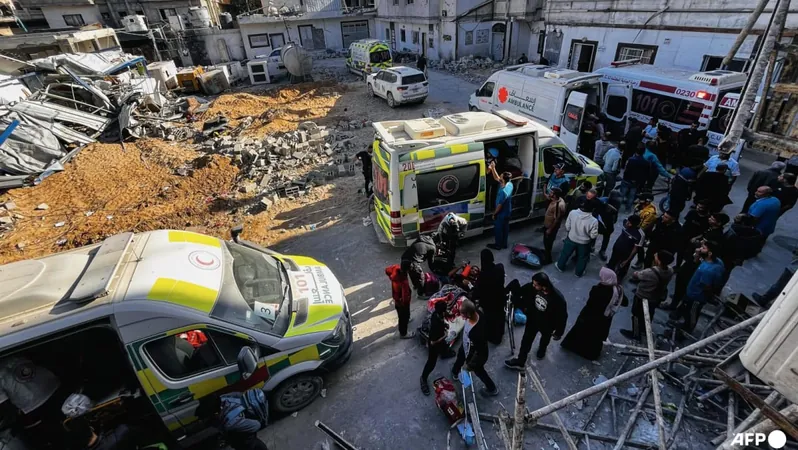
Drastic Medical Evacuation from Gaza Scheduled for This Week – What’s at Stake?
2024-11-05
Author: Wei
Significant Medical Evacuation Planned
GENEVA: The World Health Organization (WHO) announced a significant medical evacuation from Gaza is set for this Wednesday, aimed at extracting over 100 critically ill and injured patients from the embattled region.
In an effort to provide relief for those suffering from the ongoing conflict, WHO officials stated that as many as 113 patients would be flown to receive medical care in the United Arab Emirates (UAE) and Romania. This operation, if successful, would mark the largest evacuation since intense hostilities erupted in early October 2023.
Current Challenges and Efforts
Rik Peeperkorn, WHO's representative for the Palestinian territories, expressed cautious optimism about the operation's execution. Currently, efforts are focused on consolidating patients from various hospitals throughout the Gaza Strip, with the Gaza European Hospital near Khan Yunis serving as the primary collection point.
The patients are scheduled to be transported early Wednesday morning to the Kerem Shalom crossing, from where they will board flights destined for the UAE and Romania. The urgency for this evacuation is palpable, with approximately 14,000 individuals awaiting medical evacuation due to grave health concerns—half of these suffering from trauma resulting from the war, while others battle serious conditions like cancer.
Historical Context of Medical Evacuations in Gaza
Since the conflict escalated following Hamas’ surprise attack on October 7, 2023, only a fraction of those in need have been granted evacuation, with fewer than 5,000 successfully leaving Gaza for medical care. Alarming statistics revealed that only 282 patients have managed to exit since the closure of Rafah, Gaza's primary border crossing, in early May—one-third of whom are children.
Call for Structured Evacuation Processes
Peeperkorn criticized the sporadic nature of medical evacuations, stating that a more structured and secure system is critical. “What we need is regular access… properly supported and facilitated, without the unnecessary risks,” he stated. He emphasized the necessity of re-establishing medical corridors: "The first medical corridor we request to be restored is the traditional referral pathway from Gaza to East Jerusalem and the West Bank, in addition to reopening routes to Egypt and potentially Jordan."
Impact of the Ongoing Conflict
The dire situation stems from the devastating repercussions of the October 7 attack, which resulted in the loss of 1,206 lives, primarily civilians, according to Israeli sources. In contrast, the aggressive retaliatory efforts by Israel have led to the deaths of at least 43,391 people in Gaza, with the majority being civilians, as reported by the Gaza health ministry—a statistic deemed credible by the United Nations.
Conclusion and Future Implications
As the world watches, the fate of those in Gaza remains precarious. The essential medical evacuation this week represents a flicker of hope amidst chaos, but it also underscores the desperate need for more permanent solutions to the humanitarian crisis.






 Brasil (PT)
Brasil (PT)
 Canada (EN)
Canada (EN)
 Chile (ES)
Chile (ES)
 España (ES)
España (ES)
 France (FR)
France (FR)
 Hong Kong (EN)
Hong Kong (EN)
 Italia (IT)
Italia (IT)
 日本 (JA)
日本 (JA)
 Magyarország (HU)
Magyarország (HU)
 Norge (NO)
Norge (NO)
 Polska (PL)
Polska (PL)
 Schweiz (DE)
Schweiz (DE)
 Singapore (EN)
Singapore (EN)
 Sverige (SV)
Sverige (SV)
 Suomi (FI)
Suomi (FI)
 Türkiye (TR)
Türkiye (TR)